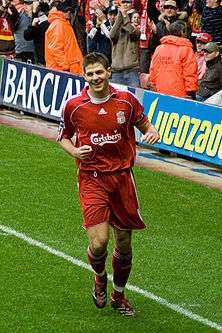Captain (sports)
In team sport, captain is a title given to a member of the team. The title is frequently honorary, but in some cases the captain may have significant responsibility for strategy and teamwork while the game is in progress on the field. In either case, it is a position that indicates honor and respect from one's teammates – recognition as a leader by one's peers. In association football and cricket, a captain is also known as a skipper.[1][2]

Various sports have differing roles and responsibilities for team captains. Depending on the sport, team captains may be given the responsibility of interacting with game officials regarding application and interpretation of the rules. In many team sports, the captains represent their respective teams when the match official does the coin toss at the beginning of the game.
The team captain, in some sports, is selected by the team coach, who may consider factors ranging from playing ability to leadership to serving as a good moral example to the team.[3] Coaches may also choose to change team captains from time to time, or to have a rotation of team captains.[3]
Some of the greatest captains in history are the ones with the most subtle of traits that are required for success. From Sam Walker in his book The Captain Class he states that a captain is "the most important factor for a team's success".[4]
Responsibilities of a captain
The responsibilities of a captain vary from sport to sport, but overall help determine the game. In sports like cricket or volleyball, the decision for the two teams to be on either defence or offence is determined with a coin toss and a decision made by the captains. This decision is crucial for the captain because they will decide the beginning of the game and quite possibly how it all plays out.
A captain is also the first one a referee looks too while explaining the results of a play or giving a foul, or flag. Oftentimes a referee will not discuss these matters with any other player than a captain or a coach. This is important because the reaction of the captain may or may not determine how the referee will proceed. A captain must stay calm and cool headed when talking with a referee to ensure the most accurate determinants of the game.
See also
References
- Phillips, James (2 July 2018). "Brazil captains: The 16 players who Tite has made skipper of the World Cup favourites". Daily Star. Retrieved 5 February 2019.
- ""skipper" Definitions". Wordnik. Retrieved 31 January 2015.
- "Oy, oy captain! Picking captains can give coaches headaches". USA Today. August 19, 2017.
- "Forget charisma and skill — the captains of the best teams in sports history shared 7 subtle traits". Business Insider. Retrieved 2018-05-01.